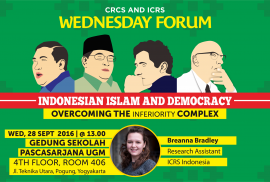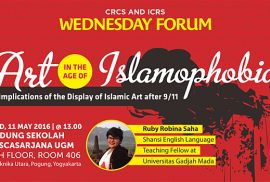
Abstract
Indonesian Islam connotes a pluralistic form of faith that is open and deeply engages local-specific cultures that concurrently emphasize a rigorous pursuit of social justice and equality for all. Despite the voluminous scholarship on Indonesian Islam, its correlation with Muhammadiyah’s “Islam Berkemajuan” and Nahdhatul Ulama’s “Islam Nusantara”—each having its own vision for a good society—remains woefully unexplained. This paper explores the interplay between Indonesian Islam and the praxis of democracy within the historical context of overcoming an apparent inferiority complex suffered by some segments of the Muslim community. The authors argue that as much as Indonesian Islam may have proven itself to be distinct from ‘the other Islams’, commonly found in its birthplace in the Middle East, there is still much to be desired for in terms of how to confidently overcome the historical baggage as a once colonized people. Using Said and Foucault’s analytical frameworks, the paper argues for a less humble attitude toward the propagation of Indonesian Islam to the outside world, given the protracted period of instability in the Middle East, ongoing terror attacks in different parts of the world and the politics surrounding Islamophobia.
Speaker
Breanna Bradley is an undergraduate student at Georgetown University’s Edmund A. Walsh School of Foreign Service located in Washington, District of Columbia, USA. Bradley’s studies focus on the relationship between culture and politics in Southeast Asia. She is currently a research assistant at the Indonesian Consortium for Religious Studies (ICRS), a Ph.D. program in Inter-Religious Studies located at Universitas Gadjah Mada, Yogyakarta, Indonesia. She has previously held positions as an undergraduate research fellow at Georgetown University’s Berkley Center for Religion, Peace and World Affairs and as a program coordinator for Georgetown University’s D.C. School’s Project, a program aimed to provide English language access for the immigrant community of the Washington DC area. She is interested in the role that Indonesian Islam plays in Indonesian culture and politics and is currently assisting with research surrounding the Tabot festival, a festival with its roots in Shia Islam celebrated by a majority Sunni community every year in Bengkulu, Sumatra.
islamophobia

Abstract
My thesis is a critical analysis of the galleries of Islamic Art in the Metropolitan Museum of Art (Met) in New York as a case study for contemporary understandings and representations of Islam through the display of Islamic art in a post-9/11 context. I explore the revival of Islamic art exhibitions since the events of September 11, 2001, where museums across the world have found themselves tasked with building and reconfiguring the display of Islamic art objects to provide visitors with a counter-narrative to the widespread fear of Islam propagated by mass media. By tracing the intertwined histories of the Islamic art discipline, colonial and post-colonial collecting practices, Orientalism and the universal survey museum, I situate my critique of the galleries within the complex realities of cultural heritage management in order to address the problematic limitations of this curatorial counter-narrative.
Speaker
Ruby Robina Saha is a Shansi English Language Teaching Fellow at Universitas Gadjah Mada. She divides her time between CRCS, where she co-teaches the Academic English course and the preparatory Summer Intensive course, and the English Language & Literature Department in the Faculty of Cultural Sciences (FIB). Prior to her appointment as a Shansi Fellow, Ruby received her BA(Hons) from Oberlin College, where she majored in Art History and Middle Eastern Studies. In 2013, she was awarded the Laurine Mack Bongiorno Prize for Art History majors, and she studied Art History and Politics at the University of Paris, where she carried out research on the galleries of Islamic art at the Louvre Museum. She wrote her graduating thesis on the politics of displaying Islamic art in Western museums after 9/11. Ruby has worked as an editor and contributing writer for several publications including The Wilder Voice, The Oberlin Review and Jurnal Humaniora. Since returning to Indonesia, her research interests have shifted to the intersection between culture and education policy, contemporary art and alternative media. After her fellowship, she plans to continue working in education and culture and intends to pursue a graduate degree in Arts Education in 2017.



